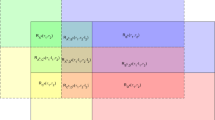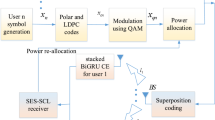Abstract
By introducing a space-time coding scheme based on amicable orthogonality, we develop a distributed differential space-time coding scheme with the amplify-and-forward (AF) method for wireless cooperative networks. The scheme requires no knowledge of the channel state information at both transmitters and receivers, and effectively decreases the realization complexity due to no channel estimation. Moreover, it has lower decoding complexity and higher coding advantage than the existing scheme, thus avoiding the shortcoming of exponential decoding complexity of some existing schemes. According tothe pairwise error probability (PEP) analysis of the system, the power allocations of source and relay terminals are jointly optimized, and as a result, the PEP is minimized, which will provide a helpful guideline for system design. Numerical calculation and simulation results show that the developed scheme is superior to the existing scheme. Moreover, the scheme with optimal power allocation yields obvious performance improvement over that with equal power allocation.
Similar content being viewed by others
References
Nosratinia A, Hunter T E, Hedayat A. Cooperative communication in wireless networks. IEEE CommunMag, 2004, 42(10): 74–80
Jing Y, Hassibi B. Distributed space-time coding in wireless networks. IEEE Trans Wirel Commun, 2006, 5(12): 3524–3536
Sendonaris A, Erkip E, Aazhang B. User cooperation diversity-Part I and Part II. IEEE Trans Commun, 2003, 51(11): 1927–1948
Laneman J N, Wornell G W. Distributed space-time-coded protocols for exploiting cooperative diversity in wireless network. IEEE Trans Inf Theory, 2003, 49(10): 2415–2425
Hunter T E, Nosratinia A. Diversity through coded cooperation. IEEE Trans Wirel Commun, 2006, 5(2): 283–289
Zhao Q, Li H B. Differential modulatin for cooperative wireless systems. IEEE Trans Signal Process, 2007, 55(5): 2273–2283
Wang G Y, Zhang Y M, Moeness A. Differential distributed space-time modulation for cooperative networks. IEEE Trans Wirel Commun, 2006, 5(11): 3097–3108
Tarasak P, Minn H, Bhargava V K. Differential modulation for two-user cooperative diversity systems. IEEE J Sel Area Commun, 2005, 23(9): 1891–1900
Chen D, Laneman J N. Modulation and demodulation for cooperative diversity in wireless systems. IEEE Trans Wirel Commun, 2006, 5(7): 1785–1794
Yiu, S, Schober R, Lampe L. Differential distributed spacetime block coding. In: IEEE PACRIM’05, Victoria, BC, Canada, Aug 2005, 2005. 53–56
Zhang Y M. Differential modulation schemes for decode-andforward cooperative diversity. In: IEEE ICASSP’05, Philadelphia, PA, USA, March 2005, 2005. 917–920
Kiran T, Rajan B. Partially-coherent distributed space-time codes scheme with differential encoder and decoder. IEEE J Sel Area Commun, 2007, 25(2): 426–433
Hughes B L. Differential space-time modulation. IEEE Trans Inf Theory, 2000, 46(11): 2567–2578
Hochwald B, Sweldens W. Differential unitary space-time modulation. IEEE Trans Commun, 2000, 48(12): 2041–2052
Ganesan G, Stoica P. Differential modulation using space-time block codes. IEEE Signal Process Lett, 2002, 9(2): 57–60
Tarokh V, Jafarkhani H. A differential detection scheme for transmit diversity. IEEE J Sel Area Commun, 2000, 18(7): 1169–1174
Tarokh V, Seshadri N, Calderbank A R. Space-time codes for high data rate wireless communication: performance criterion and code construction. IEEE Trans Inf Theory, 1998, 44(2): 744–765
Simon K M, Alouini M S. Digital Communication Over Fading Channels: A Unified Approach to Performance Analysis. New York: Wiley, 2000
Author information
Authors and Affiliations
Corresponding author
Additional information
Supported partially by the China Postdoctoral Science Foundation (Grant No. 2005038242) and the startup fund of Nanjing University of Aeronautics and Astronautics (Grant No. S0855-041)
Rights and permissions
About this article
Cite this article
Yu, X., Bi, G. & Xu, W. Low-complexity distributed differential spacetime coding scheme for amplify-and-forward cooperative networks. Sci. China Ser. F-Inf. Sci. 52, 1418–1427 (2009). https://doi.org/10.1007/s11432-009-0117-6
Received:
Accepted:
Published:
Issue Date:
DOI: https://doi.org/10.1007/s11432-009-0117-6




